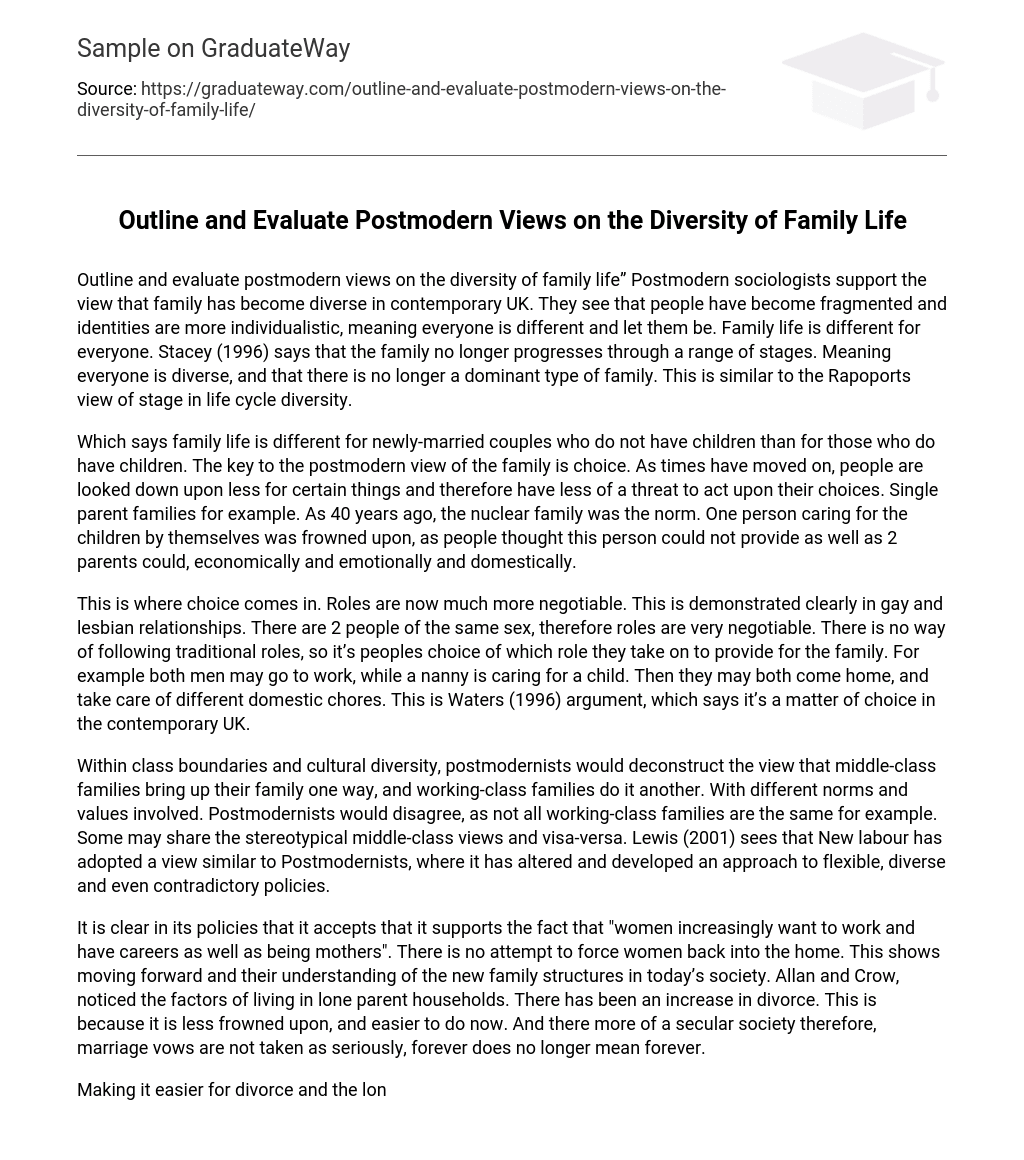Postmodern sociologists argue that family life has become more diverse in modern-day UK. They observe that individuals have become fragmented, and their identities are now more individualistic, allowing for uniqueness to prevail. Every family’s experience is different and should be respected. Stacey (1996) contends that families no longer conform to a linear progression of stages, further emphasizing the diversity within families. This aligns with Rapoport’s perspective on the diversity of family life across different stages in the life cycle.
The postmodern viewpoint emphasizes the importance of choice in families, particularly among newly married couples with and without kids. Society now accepts a wider range of family arrangements, including single-parent households. In the past, the traditional nuclear family was considered normal, while individuals who raised children alone were stigmatized. This negative perception arose from the notion that a single parent couldn’t provide the same level of financial, emotional, and household support as two parents could. However, changing times have diminished these prejudices and given people more freedom to decide their own family dynamics.
In same-sex relationships, traditional roles are more flexible as both partners share the same gender. This grants couples the liberty to select the role they wish to assume in supporting their family. For instance, they might opt for both individuals working outside of the home while enlisting a nanny to care for their child. Upon returning home, they can divide household tasks amongst themselves. As per Waters (1996), this is regarded as a personal decision within contemporary UK.
Postmodernists challenge the belief that middle-class families and working-class families have distinct approaches to raising their children within the boundaries of class and cultural diversity. They argue that there is not a uniform set of norms and values for each class. For instance, some working-class families may hold middle-class beliefs, and vice versa. Lewis (2001) notes that New Labour has embraced a similar perspective to postmodernists, as evidenced by their flexible, diverse, and sometimes conflicting policies.
The policy of the organization clearly indicates its acceptance and support for the idea that women wish to pursue careers while being mothers. It does not impose any pressure on women to stay at home. This demonstrates their progressive approach and acknowledgment of the changing family dynamics in contemporary society. Allan and Crow observed the factors contributing to the rise of single-parent households, such as the increase in divorces. These divorces are more acceptable and easier to obtain now compared to the past, while society has become more secular, resulting in marriage vows being less regarded as lifelong commitments.
Facilitating the growth of divorce and single-parent households becomes simpler. Conversely, the postmodernist perspective on the variety of family life can be assessed alongside functionalist and new right perspectives. The new right perspective, similar to functionalism, regards the nuclear family as the traditional and optimal family structure. The new right criticizes alternative family forms, such as single-parent and gay and lesbian families, and holds a pessimistic view of family diversity.
They believe that single parent families are unable to effectively raise a child with only one parent present. They diminish their capability of providing for the family as well as a nuclear family could. Bianca in Eastenders exemplifies this perspective. We witness her facing difficulties in securing employment, consequently hindering her ability to adequately support her family financially. Additionally, she lacks sufficient time for all her children, resulting in an inadequate provision of complete emotional satisfaction. Functionalists may argue that this is why her oldest son, Liam, became involved in a gang and engaged in criminal activities.
According to Dennis (1993), boys without male role models are prone to engaging in delinquent behavior. Some new right thinkers consider single parents as the ‘underclass’, labeling them as ‘work-shy’ and ‘benefit scroungers’. They also criticize single parents for having short-term sexual relationships and having children with men who do not take responsibility for their offspring. These negative views pertain to this type of family structure. Functionalists argue that the nuclear family is the optimal structure, asserting that women are essential for providing emotional support to the family and taking care of domestic chores. This perspective is also known as the warm bath theory.
She helps the man unwind after a demanding day at work by preparing a comforting bath for him, facilitating relaxation and family bonding over a glass of wine. On the other hand, the man plays a pivotal role in the nuclear family by providing financial backing. Although new labour appears to endorse various family arrangements, it still harbors unfavorable opinions towards non-nuclear families. They perceive teenage pregnancy as a societal issue that contradicts the concept of diversity, given that people progress through different stages in life.
According to Duncan (2006), New Labour’s assumption that teenage pregnancy is a social problem is challenged. Duncan argues that New Labour has not addressed the broader structural factors contributing to social disadvantage. Critics of New Labour argue that their approach is contradictory. While they acknowledge the changing nature of families, they still promote marriage and traditional nuclear families as the ideal. This implies that, despite superficially supporting diverse family structures, their policies remain biased towards the nuclear family.





